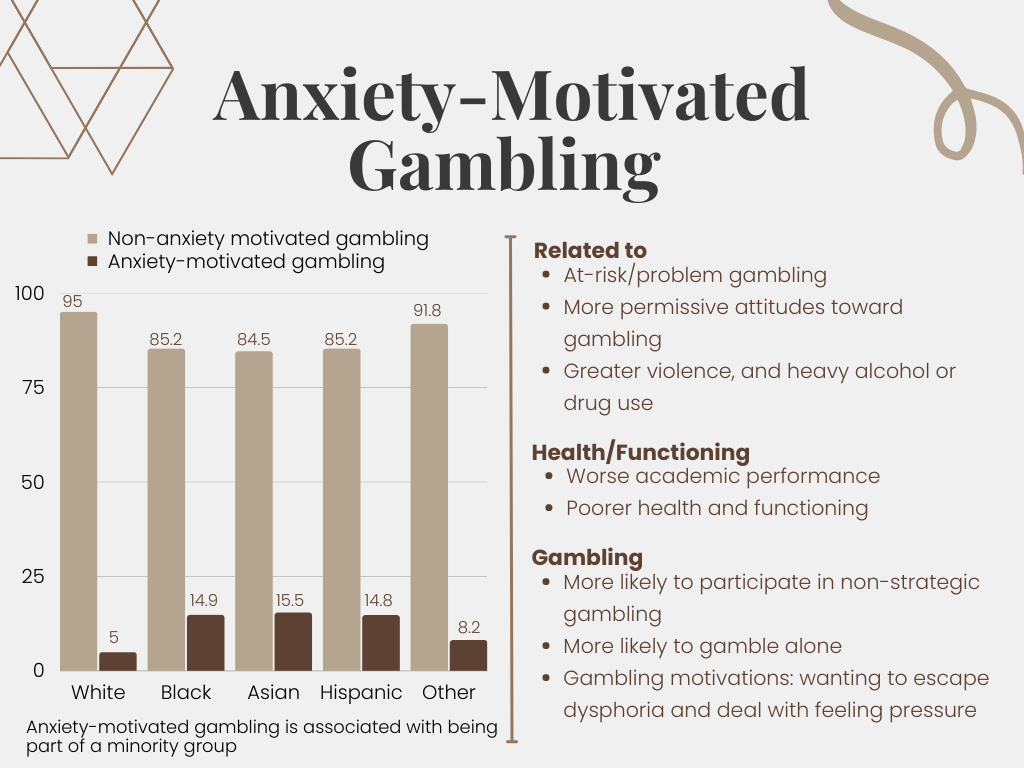People gamble for many different reasons. Some gamble because they find that it relieves their anxiety, at least temporarily. Through a process known as negative reinforcement, relief from anxiety leads to more gambling, which can set the stage for a dangerous and escalating cycle. This week, The WAGER reviews a study by Emma Cardwell and colleagues that examined adolescents who gamble to relieve anxiety and how they differ from adolescents who gamble for other reasons in terms of their health, functioning, problem gambling severity, and gambling patterns.
What was the research question?
What is the relationship between anxiety-motivated gambling, and health/functioning and gambling-related measures among adolescents?
What did the researchers do?
The authors surveyed 1,856 Connecticut high school students. The survey measures demographic characteristics, anxiety-motivated gambling, problem gambling severity, gambling perceptions, health/functioning, and gambling characteristics. The researchers created separate groups based on reasons for gambling and used Chi-square analyses to explore how the groups differed on key variables. They also used both binary and multinomial logistic regression to study how gambling motives related to key variables while controlling for covariates (e.g., gender, ethnicity, grade).
What did they find?
Among the high schoolers, 6.4% reported anxiety-motivated gambling. In all racial/ethnic groups, most teens reported gambling for excitement and other reasons not related to anxiety. However, the proportion who gambled to relieve anxiety was higher in the Black, Asian, and Hispanic groups compared to the White group (see Figure). Those who gambled to relieve anxiety were also more likely to report at-risk/problem gambling, hold more permissive attitudes towards gambling, and report more problems with violence and heavy alcohol or drug use. They also reported worse academic performance and poorer health and functioning. In terms of their gambling patterns, those who gambled to relieve anxiety were more likely to participate in non-strategic gambling (e.g. slot machines, bingo) and to gamble alone; additionally, they were more likely to report gambling to escape dysphoria and because they felt pressure to gamble. However, overall anxiety-motivated gambling was less common compared to excitement-seeking gambling (67%).

Figure. Key findings from Cardwell et al. (2022) about the relationship between anxiety-motivated gambling, and health/functioning and gambling patterns. Click image to enlarge.
Why do these findings matter?
This study demonstrates that a meaningful proportion of adolescents gamble to relieve anxiety, and this is especially common among teens minoritized by race/ethnicity. Results from this study can inform prevention programs to include a focus on emotional regulation for anxious adolescents engaging in gambling, such as mindfulness skills training. These types of programs might also be effective in preventing other risky behaviors among youth, including drug use or violence. For adolescents who have more severe anxiety and gambling problems, cognitive behavioral therapy has shown effectiveness in treating both conditions. Future studies may want to further examine negative reinforcement of anxiety-related behaviors, particularly among minority groups.
Every study has limitations. What are the limitations of this study?
This study assessed anxiety with only one survey question and did not explore the full range of aspects of anxiety that may be related to gambling. Also, data were self-reported and might not accurately measure the participants’ behaviors, due to recall bias (i.e., difficulty remembering past events and feelings).
For more information:
Do you think you or someone you know has a gambling problem? Visit the National Council on Problem Gambling for screening tools and resources. The National Problem Gambling Helpline is also available 24/7 to help individuals in the United States. For additional resources, including gambling and self-help tools, please visit The BASIS Addiction Resources page.
— Taylor Lee
What do you think? Please use the comment link below to provide feedback on this article.




